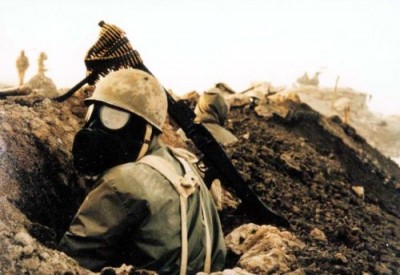After Shocking Beheading, “Moderate” Rebels Allegedly Unleashed Chemical Weapons In Syria

Not long after a U.S.-backed rebel group in Syria received worldwide attention for a beheading, the group may have deployed chemical weapons in Aleppo.
A video of the rebels, known as Harakat Nour al-Din al-Zenki, beheading a 10-year-old Palestinian boy went viral last month, and on Wednesday, the Russian defense ministry said al-Zenki rebels were responsible for a chemical gas attack on the Old City of Aleppo.
“On August 2, 2016 at 19 hours 05 minutes militants from the Harakat Nour al-Din al-Zenki group, considered by Washington as ‘moderate opposition,’ launched poisonous materials from the Sukkari district towards the eastern part of Aleppo,” the ministry reported, according to RT.
Quoting Syria’s state-run SANA news agency, RT continued:
“A ‘terrorist attack’ on the Old City of Aleppo with ‘shells containing toxic gas’ led to the deaths of five and suffocation of eight more civilians, the outlet quoted the city’s health director, Mohamad Hazouri, as saying.”
Watch “Five dead, dozens injured in chemical gas attacks in Syria” from RT America:
“We’ve taken 12 injured people, six other patients have already died from suffocation. Our doctors were prepared to treat people showing symptoms of gas poisoning. We’ve been expecting terrorists to use weapons of this kind.”
The rebels, whom the doctor referred to as “terrorists,” are still considered potential allies by the Obama administration. In 2014, the faction was part of a coalition that received military supplies from the United States, including anti-tank missiles.
The U.S. has repeatedly accused the Syrian government of chemical weapons use, despite a lack of conclusive evidence. Meanwhile, the Obama administration has ignored evidence that its rebel allies are committing similar war crimes. The renowned investigative journalist Seymour Hersh reported in 2014:
“The joint chiefs also knew that the Obama administration’s public claims that only the Syrian army had access to sarin were wrong. The American and British intelligence communities had been aware since the spring of 2013 that some rebel units in Syria were developing chemical weapons.”
The U.S. government’s reaction to the latest incident seems to be following a familiar pattern. On Wednesday, State Department spokesperson Mark Toner gave a vague answer when pressed by Caleb Maupin, an RT reporter and MintPress News contributor.
“We condemn strongly the use of any chemical weapons and any credible allegations of their use in Syria we’ll investigate,” Toner told Maupin.
Toner further claimed the U.S. is still investigating the beheading, adding: “I know that the group itself said that they’d also made some arrests and set up a commission of inquiry into the incident.”
Last month, Toner said the State Department would reevaluate its support for al-Zenki rebels if it found proof of the beheading incident.
“If we [the United States] can prove indeed what happened and this group [al-Zenki] was involved in it… it would give us pause about any assistance or frankly any further involvement,” Toner told RT.
Despite these assurances, it’s likely that Western weapons and military aid will continue to flow to extremist groups. In December, investigative journalist Peter Oborne reported that military aid from the U.S., United Kingdom and their allies to the Free Syrian Army and other so-called “moderate” groups routinely ends up in the hands of terrorists — all in the name of destabilizing the Syrian government under President Bashar Assad.
“The weapons conduit that the West gave to the FSA is understood to be a sort of Wal-Mart that the radical groups can take weapons and use to fight Assad,” Oborne wrote. “The weapons migrate along the line to the more radical elements.”
Watch “Are chemical attacks enough for US to pull aid from ‘moderate’ rebels?” from RT America:

